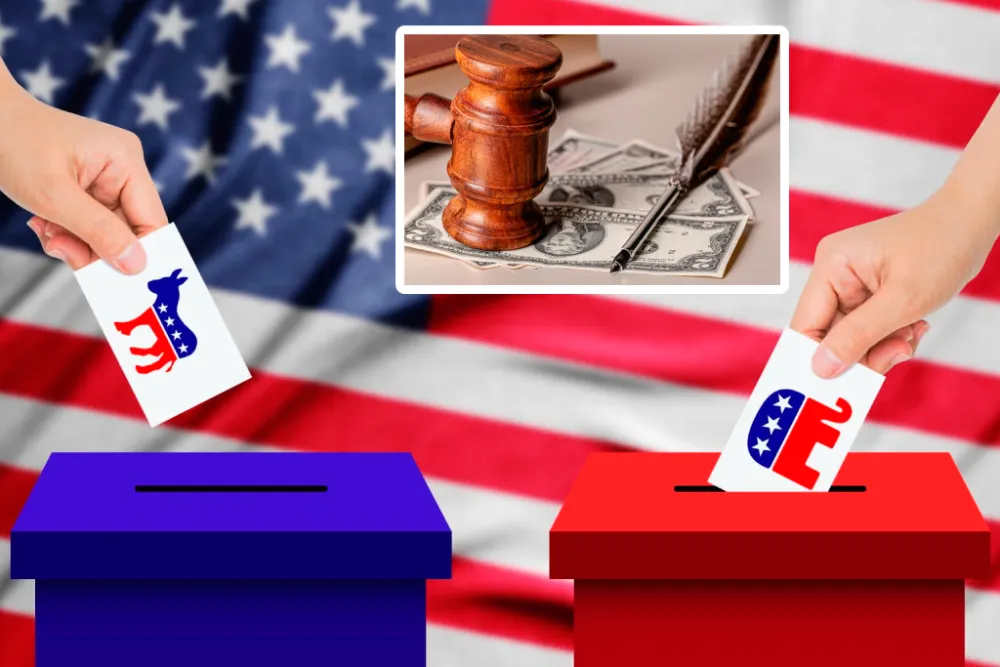Table of Contents
The phrase “socially liberal, fiscally conservative” has become a defining stance for a growing number of voters who feel out of place in the current polarized political landscape.
This ideology combines a belief in personal freedom with fiscal responsibility, but often finds itself overlooked in the current two-party system. And, with America’s politics becoming more divided, it’s key to understand what this middle ground means.
What does “socially liberal, fiscally conservative” mean?
At its core, being socially liberal means supporting individual freedoms, like the right to marry who you choose, make personal health decisions, or express your identity without government interference. Fiscally conservative individuals, on the other hand, believe the government should limit its involvement in the economy and favor lower taxes, less spending, and minimal regulation.
Combining these two principles leads to a philosophy that supports freedom in both personal life and economic policy—essentially, this means advocating for less government in both spheres.
Thank you. Fiscally conservative, socially left doesn't mean cutting everything. It drives efficiency, addressing causes at the root. And creating an environment for third party and charitable providers. Don't look to recent governments as good examples.
— Kim Farwell (@kafarwell) July 1, 2018
A growing but overlooked group
Surveys have shown that up to 59% of Americans identify as “fiscally conservative and socially liberal.” This group is not confined to one political party—they are fed up with both extremes.
On the left, progressives often push for expensive social programs, while on the right, social conservatives demand moral restrictions, such as banning abortion or limiting LGBTQ+ rights. For those who believe in limited government in both areas, neither side feels like a comfortable home.
This group’s ideology doesn’t fit neatly into the current two-party system. Socially liberal, fiscally conservative voters reject the extremes on both sides. They believe that personal freedom should be respected and that government spending should be accountable. This often puts them at odds with both parties—on the right, they oppose big government spending, and on the left, they resist the fiscal policies that would fund progressive agendas.
Challenges and contradictions
Critics—especially from the left—argue that the combination of social liberalism and fiscal conservatism is contradictory. For instance, they claim that supporting social causes like racial equality or environmental protection while opposing the taxes needed to fund such programs is inconsistent.
However, socially liberal, fiscally conservative voters do not believe in government overreach, and their stance focuses on finding a balance. They argue that social progress can and should be achieved without unnecessary government intervention, and that fiscal responsibility is key for promoting long-term sustainability.
For example, many in this group might support policies like universal healthcare, but only if they come with strict controls on government spending to avoid further national debt. Similarly, they support civil rights and personal freedoms but reject government funding for programs they see as wasteful or inefficient.
In today's highly politicized world, TWO ECONOMIES are becoming more and more and more polarized - left vs. right, liberal vs. conservative - how do you figure out who YOU want to invest your money in?
— E (@ElijahSchaffer) March 14, 2024
We discuss all this and more of your financial concerns every Saturday at… pic.twitter.com/gXdiaRmg7r
The role of Libertarianism
Libertarianism shares many similarities with the socially liberal, fiscally conservative ideology. Libertarians advocate for minimal government involvement in both personal lives and economic affairs, and they instead focus on individual liberties and free market principles. In fact, many socially liberal, fiscally conservative voters also identify with libertarian ideals, especially when it comes to limiting government spending and intervention.
However, not all who hold these views consider themselves libertarians. Many simply want a balanced approach—one that maximizes personal freedom and fiscal responsibility without pushing the extremes found in today’s politics. These voters want a government that focuses on essential services and leaves the rest to individuals and the free market.
A future of balance
Though the socially liberal, fiscally conservative ideology may not dominate mainstream political discourse, it has the potential to influence future policy and help define a more balanced approach to governance. And this is urgent—in a political environment where the lines between parties grow ever sharper, the need for this middle-ground philosophy has never been clearer.
For socially liberal, fiscally conservative voters, the challenge is finding a political home that respects both their economic beliefs and their support for individual freedoms. While the major parties may not fully represent them, this group’s growing numbers indicate that a more balanced, less interventionist approach to governance could have a significant impact in future elections.





